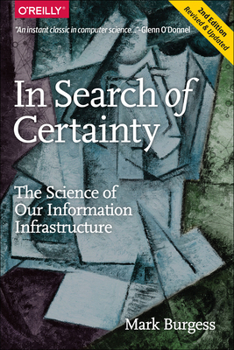In Search of Certainty: The Science of Our Information Infrastructure
Quite soon, the world's information infrastructure is going to reach a level of scale and complexity that will force scientists and engineers to approach it in an entirely new way. The familiar notions of command and control are being thwarted by realities of a faster, denser world of communication where choice, variety, and indeterminism rule. The myth of the machine that does exactly what we tell it has come to an end.
What makes us think we can rely on all this technology? What keeps it together today, and how might it work tomorrow? Will we know how to build the next generation--or will we be lulled into a stupor of dependence brought about by its conveniences?
In this book, Mark Burgess focuses on the impact of computers and information on our modern infrastructure by taking you from the roots of science to the principles behind system operation and design. To shape the future of technology, we need to understand how it works--or else what we don't understand will end up shaping us.
This book explores this subject in three parts:
Part I, Stability: describes the fundamentals of predictability, and why we have to give up the idea of control in its classical meaningPart II, Certainty: describes the science of what we can know, when we don't control everything, and how we make the best of life with only imperfect informationPart III, Promises: explains how the concepts of stability and certainty may be combined to approach information infrastructure as a new kind of virtual material, restoring a continuity to human-computer systems so that society can rely on them.




